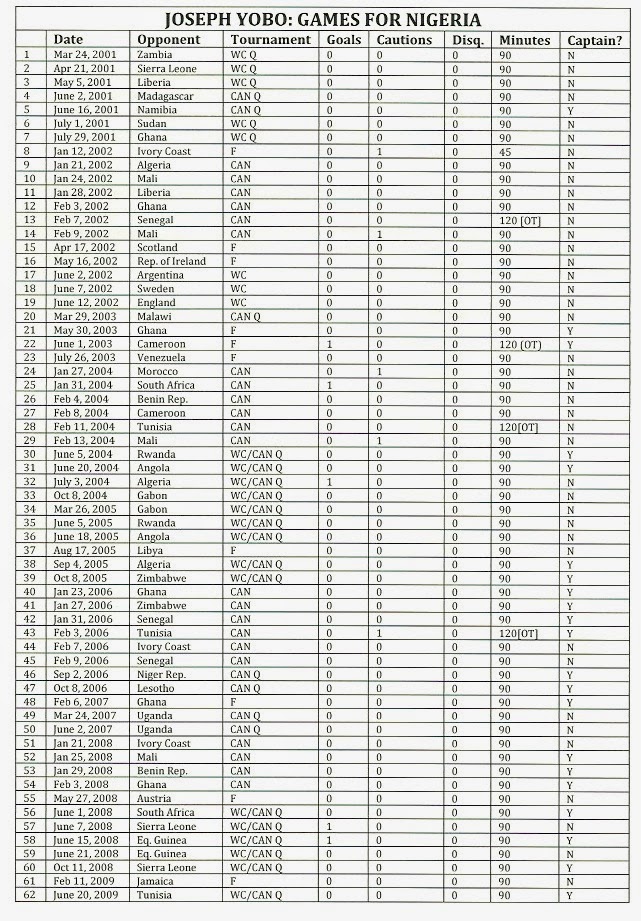Beyond Egypt and Nations Cup
One
of the things that we now know is that the Nigerian Football Federation (NFF)
does not learn from history nor does it learn from data. One can only hope that
NFF’s attitude towards history and data changes, particularly in an era of the
much-vaunted “capacity building.” Perhaps, “capacity building” will include NFF
building its own capacity to utilize data and plan with data in mind. Following
the defeat in Alexandria and Nigeria’s elimination from the Cup for African
Nations (CAN), it is important to point to a few things that make a difference
in whether or not the Nigerian national team is often successful.
An
explanation for Nigeria’s biggest successes come from long term planning and
sustained work by coaches appointed to lead the full national team. While it is
clear that some of the nation’s problem transcends coaching or technical
management, there is an aspect of that problem that is attributable to the
team’s lack of sustainable technical management. These problems are not easily
solved by merely appointing a foreign coach as the current noise for
appointment of foreign coaches argue. Instead, it comes from the willingness of
the NFF to allow the coach, local or foreign, to work independently and with
support and not sabotage as was the case during the tail end of Keshi and then
Oliseh’s tenure. Further, the NFF has to allow the coach time to build a very
competitive team as demonstrated under Westerhoff and then Stephen Keshi when
Nigeria not only won the CAN but on each occasion reached the elimination round
of the FIFA World Cup.
There
is already a growing cry to sack Samson Siasia, whereas the more logical
decision is to keep him since the qualification for the 2018 World Cup is
around the corner. Siasia has demonstrated his ability with the Olympic team
back in 2012 and with the U20 team and there is no major reason to discard him because
of Nigeria’s failure to qualify for the 2017 CAN. After all, as you look at the
data on Table below the coaches who were appointed just before a major tournament,
local or foreign coach, have usually performed poorly for Nigeria at least in
the last 10 years. Such appointments are quick trigger actions that explain
Nigeria’s inability to perform to potential in major tournaments. The table
shows, with two explainable exceptions, that coaches appointment less than 12
months before a tournament are likely to perform poorly. That exception is
Eguavoen’s appointment in July 2005. However, Eguavoen, though new as head
coach, had already served on the prior coaching crew for over a year. In
essence, he knew the players and he knew what to work on. The other exception
is Keshi’s failure in the CAN qualifiers for 2015. Again, this can be explained
as the NFF was publicly working against the head coach whom they saw as acquiring
more power than the NFF. The NFF sabotage of the coach’s efforts included
removing his staff, forcing him to pay others from his wages, reportedly
renting a protest crowd in one of the games, and firing and then reinstating
him, among other measures. In essence they created a disabling environment for
the coach that most likely affected the on-field product.
________________________________________________________________________________
POINTS: World Cup: Winner (22), Finalist (20), Third (18), Fourth (16), Quarterfinalist (14), Second Round (10), Group (2). Note Lagerback earns 0 points as he did not qualify the team for the World Cup. CAN: Winner (12), Finalist (10), Third (8), Fourth (6), quarterfinalist (4), Group (2). CHAN: Winner (8), Finalist (6), Third (5), Fourth (4), quarterfinalist (3), Group (2).
_________________________________________________________________________________
Therefore, I argue that staying with Siasia is more likely to give Nigeria and its current
team a better chance of qualifying for the 2018 World Cup finals. Watching the
match in Egypt it is easy to observe how the Egyptian team appeared superior in
tactically countering the Nigerian team. This perhaps denotes the fact that the
Coach, Samson Siasia, needs more time to apply his tactics and ensure its
adoption by his team. He had less than a week to work with the team and that is
certainly not enough time to counter a competitive Egyptian team that had
months of tutelage under Hector Cuper. Yet, Siasia’s team showed enough signs
of competitiveness to promise a better future. The upcoming June international
window could be used to play multiple international friendlies in preparation
for the World Cup qualifiers that begin early in October. The same can be done
during the September window when Nigeria will also play its last and
meaningless CAN qualifier against Tanzania.



Comments
Post a Comment